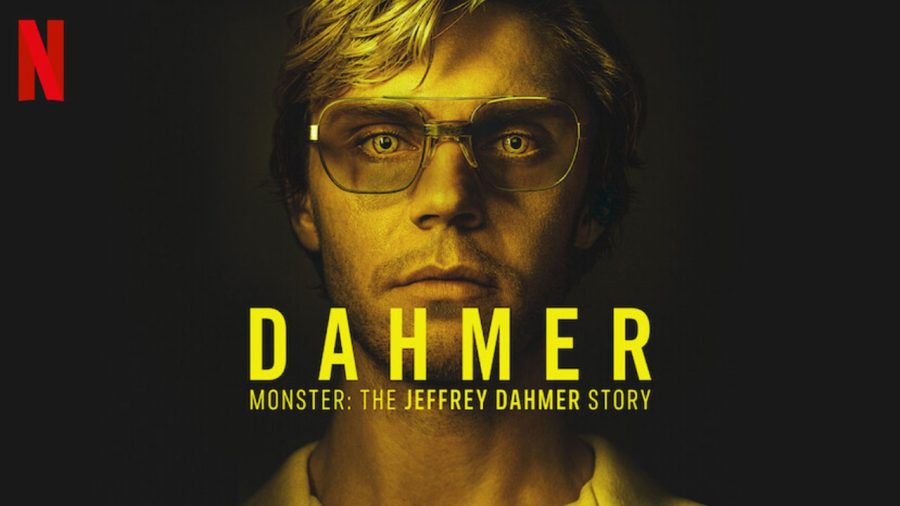The Ethics of True Crime: The Monetization of Trauma
October 28, 2022
Netflix’s new crime fiction series “Dahmer – Monster: The Jeffrey Dahmer Story” has broken records for the amounts of views it has garnered in the timespan since release, definitively beating out both Squid Game and Bridgerton with over half a million views in the first week. It sits at 9th place in Netflix’s most watched series category of all time as of now.
The show takes a closer look at Jeffery Dahmer, the Milwaukee Monster, who killed and subsequently ate portions of the victims. There were 17 young men in total who lost their lives to Dahmer, predominately gay and/or people of color. It aims to explain how the serial killer stayed off the police’s radar for so long, adding to the misery of more families that could have been stopped.
The series cast Evan Peters as the cannibalistic serial killer. Peters has been in roles similar to Dahmer, albeit fictional like “American Horror Story” antagonist Tate Langdon, a sociopath serial killer, and Kai Anderson, a cult leader. However, there is a significant difference in these portrayals as two are completely fictitious, with creative liberties taken in the acting, whilst one is based on a real person, the repercussions of whose crimes are still felt and reverberated on a daily basis.
The series release has raised some concerns about the true crime industry as a whole. Statements from the families whose lives have been irrevocably altered since their loved one met Dahmer have released statements on the show.
Rita Isbell, sister of Errol Lindsey, took the stand at Dahmer’s sentencing in 1992. The show depicts this real life moment word for word.
She talks about how realistic it was, the hair and outfit.
“That’s why it felt like reliving it all over again. It brought back all the emotions I was feeling back then.”
The series did not consult her before having her likeness used, as technically the entire trial is in the public domain.
“The episode with me was the only part I saw,” Isbell is recorded saying in an as-told-to essay for Insider. “I didn’t watch the whole show. I don’t need to watch it. I lived it. I know exactly what happened.”
Most of the victims did not receive time on the series like a few of the victims. An entire episode of the ten episode series was devoted to Tony Hughes, a black, deaf and gay aspiring model in Milwaukee.
Shirley Hughes, his mother, spoke to the Guardian about the show, “I don’t see how they can do that. I don’t see how they can use our names and put stuff out like that out there.”
Many people watch this show, not paying any attention to families of the victims and their thoughts.
Audiences have become so desensitized to crimes. Twenty-four seven news outlets constantly reveal horrendous events happening around the world. As awful tragedies happen more and more often, people’s reactions to them become stale.
True crime has especially found a place online: multiple YouTube channels dedicated to talking about gruesome murders whilst putting on makeup.
TikToks have circulated, calling people who hate Dahmer homophobic and creating edits of Peters as Dahmer and edits of the real serial killer. Other people say that the show was not graphic enough, wishing for more details to be shown.
A fantasization with the disturbing has existed since the beginning of time. The wonder behind unspeakable actions is inevitable, but new true crime has driven it to a whole new level of obsession. Rather than an interest, an infatuation has taken root. Serial killers have become romanticized, some people choosing to sweep their crimes under the rug to discuss what they deem more pertinent: their looks.
TV shows and movies about real life people have been known to change public opinion. “I, Tonya” came out in 2017 and turned the tide of public perception on her. During the Nancy Kerrigan scandal, the public despised Tonya Harding for the attack, turning to their opinions when insufficient evidence turned up for convicting Harding of the act.
The main difference between Harding’s story and the tv show about Dahmer lies in the fact that Tonya was not found guilty, and Dahmer was a convicted serial killer and cannibal. Defending Harding due to her cruel environment is not the same as defending Dahmer, since her abuse gives insight onto her personality. Other people try to use Dahmer’s upbringing to deflect from the disgusting actions he did later in life. Many people come from tumultuous childhoods and do not become serial killers who cannibalize their victims.
This online culture of loving a serial killer thrives like the name suggests: online.
It is so easy to share an opinion online, hiding behind a username.
This isn’t anything new.
But people fail to see how far the internet reaches, these things being brought, oftentimes unintentionally, to the view of people affected by these atrocious events.
Many people would not directly tell the families of Dahmer’s victims that they wish they could see more graphic detail of their loved one’s death and/or that they find the killer and person who cannibalized their family member attractive.
The families affected should always be taken into account. Their trauma may get easier with age, but it does not fully go away and is easily brought to the forefront of their mind when reminded.
“Dahmer – Monster: The Jeffrey Dahmer Story”, whose aim is to shed light on his victims, did not have the families’ permission to be made.
Even while it isn’t a legal issue, it is a matter of ethics.
It should be no surprise that Netflix’s goal is to make money, but it paints an interesting picture of the online culture that allows for romanticization of a serial killer rather than focusing on the families of the victims’ opinions.






Erin Schyck • Jan 14, 2023 at 5:00 AM
Good afternoon! I stumbled across this article as I was searching for mentor pieces for my students in middle school. They are doing some true crime research and you knocked it out of the park! First, I would very much like to use your piece as a mentor text for them if I may. SEcond, I am bookmarking your school newpaper because this is amazing! You all have done an EXCELLENT job (and I am jealous). I will defnitely be sharing the link, but I would love to print the article for them (especially the “About the Contributor” not only because I’d love to do that as well, but for them to see it really is someone just a little older than them!
Thank you again for your excellent work!
Ben Jensen • Jan 17, 2023 at 9:11 AM
Hello! We are so touched by your comment! We are very happy that you will be sharing this article with your students. Feel free to print it out so that you can share it with them. Thank you very much for your very touching comment!
-Benjamin Jensen (Journalist)